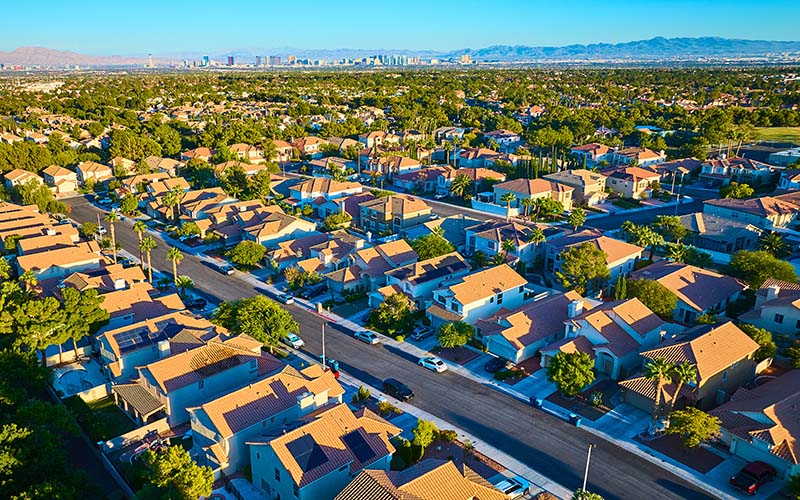What is a homeowners association? Before buying a home in an HOA community, it is important to understand what HOAs are and what they do. Not everyone is well-suited for HOA living, and buyers should consider all factors before signing on the dotted line.
What Does HOA Stand For?
HOA stands for Homeowners Association, which is a type of CIC (Common Interest Community) that features one or more shared communal spaces. A HOA can refer to single-family communities, townhome associations, and even condominiums. Condominiums may also be called a COA, or a condominium owners association, and in this article, the term may be used interchangeably.
What is a Homeowners Association?
Simply put, a homeowners association is an organization responsible for managing and maintaining a community. Typically, an HOA oversees a planned development or subdivision. It is common for builders to form a Homeowners Association (HOA) at the start of a project. This way, homeowners’ organizations can look after the common areas and amenities.
A condo association (COA) is similar to an HOA. The primary difference is that a condo association manages a condominium building or complex. In this community, owners own individual units, and there are more shared elements.
What is the Purpose of a Homeowners Association?
Now that we have defined what an HOA is, it is important to understand what this association is actually for. An HOA’s main purpose is to manage and operate the community. This involves a variety of tasks, including common area maintenance, collecting dues, and enforcing rules.
The objective of an HOA is to maintain curb appeal, preserve property values, and keep resident satisfaction high. Because property values tend to remain strong andor even increase under the management of an HOA, many buyers prefer living in HOA communities. They can protect their investment in this way and potentially turn a profit if they decide to sell in the future.
What Does an HOA Do?
The exact responsibilities of an HOA can vary from one community to another. Generally, state laws and the association’s governing documents will define the duties of the HOA. In Virginia, HOAs are governed by the Virginia Property Owners Association Act and the Virginia Condominium Act.
That said, an HOA or COA is usually in charge of the following:
- Collecting dues and assessments
- Enforcing the rules and regulations
- Holding regular meetings
- Managing the association’s finances
- Preparing annual budgets
- Planning reserve funding
- Maintaining common areas
- Hiring and managing vendors
- Ensuring adequate insurance for the association
- Planning social events and gatherings
- Communicating with homeowners
- Complying with federal, state, and local laws
Homeowners Association Pros and Cons
Homeowners Association Benefits

Here are the advantages of living in an HOA community:
- Consistent Appearance. Associations typically enforce rules on home appearance, landscaping, and exterior maintenance. This helps preserve neighborhood aesthetics and property values.
- Access to Amenities. Many HOAs offer shared amenities such as pools, parks, clubhouses, or gyms, which are funded and maintained through dues.
- Shared Responsibility. Associations manage common areas, landscaping, and sometimes exterior repairs. This reduces the burden on individual owners.
- Rules Promoting Order. Many HOAs enforce rules to help maintain peace and order. These rules can include noise restrictions, parking regulations, and other relevant guidelines.
- Financial Planning. A well-run HOA plans for long-term maintenance, using reserve funds for major repairs or improvements, which can prevent unexpected costs.
- Property Value Protection. By enforcing covenants and ensuring upkeep, HOAs help maintain or increase property values in the community.
- Sense of Community. Associations often host social gatherings, enabling neighbors to get to know one another and cultivate a sense of community and belonging.
Homeowners Association Drawbacks

Here are the disadvantages of living in an HOA community:
- Mandatory Fees. Homeowners are required to pay regular dues to the association, which are used to cover the community’s upkeep and management.
- Rules. Associations have rules in place that homeowners must follow. While some may not like rules, it is important to remember that these rules help maintain harmony in the community.
- Risk of Mismanagement. Volunteer homeowners run associations, so there is always a risk of mismanagement. Fortunately, it is easy to curb this risk by electing capable leaders and hiring professional management.
What Happens if You Don’t Pay HOA Dues?
One of the main responsibilities of homeowners in an HOA is to pay regular fees. Also known as dues, this money is deposited into the association’s operating account. The HOA uses these funds to pay for various expenses related to the maintenance, management, and upkeep of the association.
Managing a community requires adequate funding. An HOA relies on third-party vendors to maintain clean and functional amenities. Many communities also hire professionals for certain services such as landscaping, HOA management, accounting, tax preparation, and legal assistance. Without dues, there would be no way to cover these costs.
When homeowners stop paying their dues, the effects can be drastic and immediate. The HOA may not be able to pay vendors and other professionals. This will lead to a lack of services, maintenance, and upkeep. Soon enough, amenities and shared spaces will deteriorate.
Homeowners also risk several penalties, including but not limited to being charged late fees or interest, loss of access to community amenities, and potential legal action against them, leading to inflated debts for owners.
In the most extreme cases, an HOA can place a lien and then subsequently foreclose on an owner’s home for nonpayment of dues. Liens will make it difficult for owners to refinance their mortgage or sell their home. If they still fail to settle their unpaid dues, the HOA can initiate foreclosure proceedings in an attempt to recoup the loss.
HOA Definition Explained
Living in an HOA involves the responsibility of maintaining community standards, paying association dues, and following rules and regulations. But these responsibilities serve the purpose of increasing property value, maintaining curb appeal, and creating a sense of community. HOAs are becoming more and more popular for these overall benefits.
National Realty Partners is a leading provider of HOA management services in Virginia. We help communities thrive. Call us today at 703-435-3800 or request a proposal online to get started!
RELATED ARTICLES:
- HOA Management Explained: Who’s Running The Show?
- The Backbone Of Any HOA: Why Governing Documents Matter
- Meet The HOA Board: Roles, Responsibilities, And Duties
